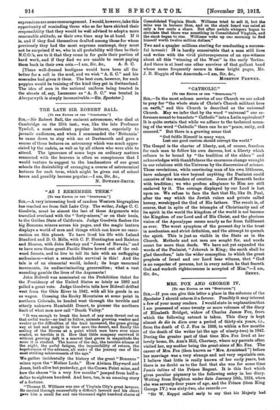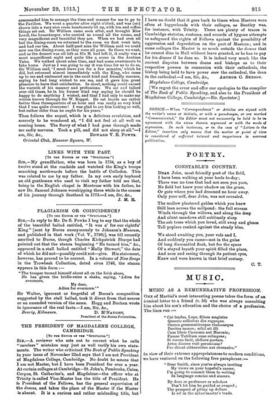MRS. FOX AND GEORGE IV.
[To THE EDITOR 07 THE "SPECTATOR"] STE,—If you can give this letter a place in the columns of the Spectator I should esteem it a favour. Possibly it may interest a few of your many readers. I would state in explanation that I am possessed of some twenty or more volumes of the diary of Elizabeth Bridget, widow of Charles James Fox, from which the following extract is taken. This diary is kept almost de die in diem. over a period of thirty-six years, i.e., from the death of C. J. Fox in 1806, to within a few months of the death of the writer (at the age of ninety-two) in 1842. During the greater part of that time Mrs. Fox lived at her lovely home, St. Ann's Hill, Chertsey, where my parents often visited her, my mother being the great-niece of Mr. Fox. The career of Mrs. Fox (then known as " Mrs. Armistead") before her marriage was a very strange and not very reputable one. I believe that little is really known of her early years, but there is no doubt as to the fact that she was for sonic time ramie intime of the Prince Regent. It is this fact which gives peculiar piquancy to the following entry in her diary. Writing from Brighton under date January 19th, 1824, when she was seventy-four years of age, and the Prince (then King George IV.) was sixty-two, she records :—
"Sir W. Keppel called early to say that his Majesty had
commanded him to arrange the time and manner for me to go to the Pavilion. We went a quarter after eight o'clock, and was (sic) shown into a very nice room handsomely lit up, with tea and coffee things set out. Sir William came soon after, and brought Miss Lovel, the housekeeper, who carried us round all the rooms, and very magnificent and beautiful they are. When we had seen all but the dining-room we returned to the room we first went into, and had our tea. About half-past nine Sir William said we could now see the dining-room, as they were all gone. So there wo went, and as the dessert was all left as His M. had left it, it really was a most magnificent sight and quite like a scene in the Arabian Tales. We walked about some time, and had some sweetmeats to take home. Just as I was going to say it was time for us to do so, Sir William said, must leave you for a few minutes,' which he did, but returned almost immediately with the King, who came up to me and embraced me in the most kind and friendly manner, saying he had long wished to see me, and it gave him great pleasure to have that satisfaction. In short, nothing could exceed the warmth of his manner and professions. We sat and talked over old times, he in his former kind way saying he should be happy to do anything I wished, and that I had only to make my wishes known through Sir W. Keppel. He sat beside me rather better than threequarters of an hour and was really so very kind that I was quite overcome! I was glad to see him looking so well, but rather older than he ought for his years."
Then follows the sequel, which is a delicious revelation, and scarcely to be wondered at, "I did not feel at all well on coming home. The flurry of what I had gone through made me sadly nervous. Took a pill, and did not sleep at all."—I Oriental Club, Hanover Square, W.



















































 Previous page
Previous page